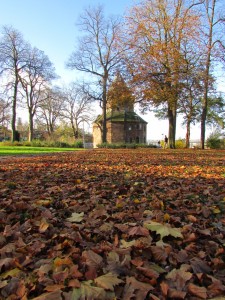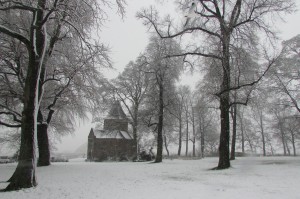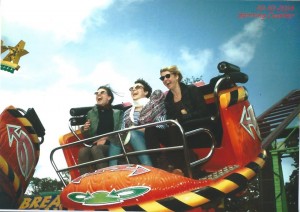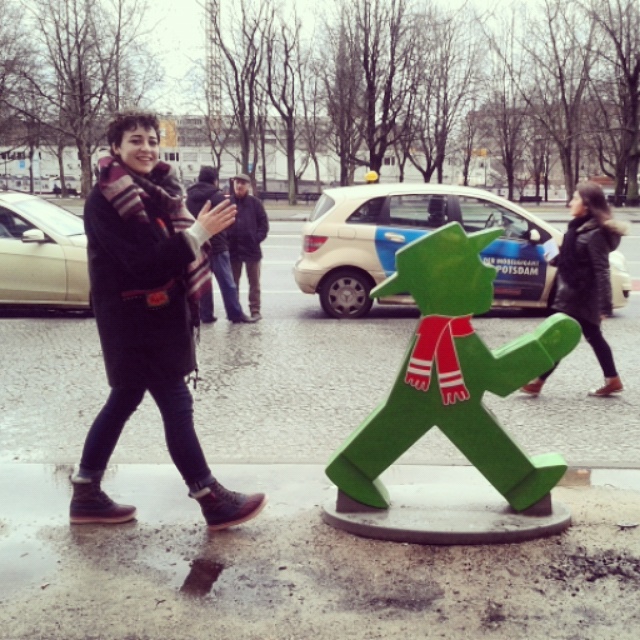PRE-DEPARTURE & ARRIVAL:
Gert Vlok Nel sings: “Ek het gesien hoe Nijmegen deur my trane lyk / Goud bly die oggend soos God se guns / die dag pragtig soos ‘n voeltjie in jou handjie.” He sings about the Waal River which flows past Nijmegen (“blou bote op die blou rivier, ek skryf ‘ek het jou lief’ met wit woorde op wit paper”) with a melancholy I certainly felt during my first few weeks here. I’ll be honest: it was hard greeting everyone in South Africa. I know 6 months isn’t a long time, I knew then that I will be okay, but I still cried until I dried up like a raisin. I still cry regularly (it makes you feel better and relieves tension, okay). If you are at all like me, I suggest your first investment for Nijmegen is a box of tissues. But, as GVN sings, Nijmegen is beautiful. The weather is unpredictable – more so than the weather in Cape Town – but whether it’s raining or the sun is shining, it looks like a fairy-tale place. Everything is tiny here. You know how they say Dutch people are so tall? I wonder if that is not an illusion caused by the teeny-tiny-ness of everything around them. It’s not that the buildings are smaller, but they are all built with bricks that can’t be described with any other word than ‘adorable’. Beers generally come in 200ml glasses (for about 2€), so you feel like a fairy drinking them (prepare yourself!). Coffee comes in small cups. Everyone drives small cars. Etcetera.
Now, for some need-to-know, fact-y stuff:
1. Visas
– You will need a residence permit to study here. The university (oh, by the way, it’s called Radboud Universiteit Nijmegen) handles the application. What you have to do is collect all kinds of documents (from your bank, from the International Office in Stellenbosch) and sign all kinds of forms (No, I don’t have TB/a criminal record/intentions of harming the citizens of the Netherlands) and then upload them onto a website, and wait. And wait. And wait. Eventually, they will let you know that your documents have been approved, and you now need to courier it to them.
– They tell you not to book a flight beforehand. I did. Don’t book a flight beforehand. It is unlikely that your visa will arrive until the last minute. I think they plan it that way so that you will get here just in time for Orientation. I had to cancel my flights (it would have been too expensive to move them to a later date), but fortunately I got a good last-minute deal with KLM.
– To be honest, I wasn’t all that impressed with how they handled the visa application (or their administration in general). They take ages to approve your documents, which means that you have to book flights late. While I was lucky to get one at an okay price, most of the flights were bloody expensive (mine was R 13 000, the others were R 20 000 + – it’s cheaper if you fly in September and not August, but then you miss Orientation). The courses that are available to take aren’t always on the website in time for your application, and registering takes aaaaaaaaages, because presumably people here don’t know how queues work. So be prepared for all that. And be patient.
2. Orientation and Accommodation
– I would recommend you doing the Orientation Week. You get to meet a lot of people from all over the world (you are given a mentor group, about 20 people per group) and they plan all kinds of activities: a campus tour (the campus is uninspiring, but it is surrounded by beautiful woods), a city tour, pub crawls and parties, mentor dinners, a boring lecture or three, a sports day, and a weekend away camping (which was cold, but I quite enjoyed it). Our mentor group still do a lot of things together – whenever someone is going on a day-trip or having lunch in the restaurant on campus (De Refter – don’t expect gourmet dishes), they invite everyone else, we have regular mentor dinners, etc.
– I chose to stay in the accommodation the university offers. I was lucky to get into Hoogeveldt, which is right next to campus (the other places are further away). My room is spacious, I have my own sink, but I share the kitchen and bathrooms with 15 other people (also international students). This is…interesting. I lived in res for four years, but it’s not quite the same. Firstly, we only get a cleaner once a week (and she only cleans the communal areas and apparently the bathrooms, although I haven’t seen any evidence of that). So we are expected to keep the place clean the rest of the time and, well, you know students. But you adapt. Each person gets their own cupboard in the kitchen and a spot in one of the fridges. There’s a stove and a microwave and a kettle in the kitchen, as well as pots and pans and cutlery and stuff like that, so you don’t really need to buy the kitchen set the university offers (I didn’t). You also don’t need to buy the linen set – you can get everything you need for cheaper from Primark or similar stores in town (I slept in my sleeping bag for the first few days until I went into town to shop).
3. Classes
– I’m doing my masters (in philosophy), and taking two courses here. This means I only have class twice a week, which gives me loads of free time to travel (or to finish my thesis). Campus is easy to navigate. My lecturers are good and funny (the one even brings us sweets every week) and the content of the courses is interesting. I would say that the ‘standard’ is similar to what we did in honours – lots of reading, lots of thinking, some headaches. I don’t feel like I know less or struggle more than the Dutch students. I won’t have to write tests or exams, but I do have a few presentations (not for marks) and essays (for marks).
4. Getting around
– Nijmegen is small, so you can walk or cycle everywhere you want. There are buses leaving regularly from campus (or wherever you are – there are a lot of bus stops as well), as well as trains going in all directions (there is a direct line to Amsterdam, and you can also travel to Berlin and Brussels from here). I suggest you buy an OV-chip card when you get here, which makes traveling easier. Apply for a personalized one as soon as possible, then you get great discounts. Also, download the 9292 app if you can – it makes traveling in the Netherlands so much easier (you just select your location and where you want to go and it gives you info on the trains, busses, and trams you can take).
5. Stuff to do in and around Nijmegen
– Nijmegen has many small pubs (try the bitterballen with a beertje) and interesting shops (as well as the usual Zara and H&M). The city centre is beautiful, with parks and old buildings and museums which you can visit. Also, quite a few impressive book stores.
– Amsterdam is only 90 minutes away by train, as is the other big cities (Den Haag, Maastricht), so it’s easy going away for the weekend. For day trips, Arnhem and Den Bosch are close by.
– Nijmegen is on the border with Germany, and you can take the bus or cycle across the border to the small town of Kleve, just to see how different things are (the houses and the people look different, the landscape is not as flat).
– I take long walks around town and the neighbourhoods and woods. This not only clears my head, but it also allows me to spot funny little details (especially on the houses), peek through people’s windows (a bit creepy, I admit, but so interesting), and pop into fascinating shops (like the one in town with a shrunken head for sale…it’s like something from Harry Potter).
– I post photos and notes on what I’m doing on my own blog (mindlikethesky.tumblr.com/tagged/travels).
6. Don’t forget to bring:
– Something which will make your room feel more like home (I brought a stuffed unicorn)
– An umbrella and raincoat which you can carry around
– A guidebook/app on your phone
THE EXPERIENCE:
In some ways it feels as if I arrived in Nijmegen a week ago, in some ways it feels as if I’ve been here for ages. I think of my room in Hoogeveldt as ‘home’ (especially now that I’ve bought some prints and vintage teacups to decorate it with), yet I also miss home home. Before we came here, we were told that we would probably follow a cycle: exhilaration and excitement, followed by a slump (around halfway, where I am now), and then adjustment. Personally, I feel like I go through this cycle every week. Some days I think “Man, I love Nijmegen!”, while others I just want to get the hell outa this place. Most of the time, I am happy to be here, albeit in a quiet way. The trees are starting to lose their leaves. The leaves that are still clinging to the branches exhibit the whole spectrum of autumn colours. The days are cold, but mostly sunny. In other words, if you are bundled up it is lovely here.

As we are getting closer to Christmas, Nijmegen is getting into the festive mood. Unfortunately, this means parades which include the infamous Zwarte Piet, and small Piet poppe hanging in shop windows. While this did not come as a shock, it still amazes me. Everywhere you go you hear about Dutch tolerance, about how progressive they are. You read about it in books. Yet here you have a tradition which is offensive to so many people, but which is still widely accepted and celebrated. The mind boggles. (Disclaimer: this of course does not apply to all Dutch people).

Another thing that really bugs me is just how difficult it is to do simple things like opening a bank account or getting documents certified (for which they charge you 12 euro! Ridiculous). There’s no such thing as quickly running an errand – opening a bank account requires you to visit at least two different branches in two different parts in town, waiting for several letters to arrive in the post, and going through a unnecessarily complicated registration process on the bank’s website. The same goes for any other kind of administrative task. They are so effective – there are so many rules in place to make the process clear and structured – that you can, in effect, get nothing done. Perhaps this explains why shops only open at around 11 am and close any time between 4 and 6 pm – everyone is too busy trying to sort their personal admin out to do actual work. The situation is exacerbated by the fact that pedestrians spend hours and hours waiting at traffic lights, instead of just crossing the road when there are no cars coming.
Something which I did not expect was how little I would deal with locals in my day to day life (other than saying thank you and please in shops). I live mostly with other international students (there’s one Dutch guy on my floor), and most of the people I spend time with are also international students. I do have a few Dutch friends, but I regret not getting to know more (thus far). While this is kind of sad, it’s also fantastic getting to know so many people from all over the world. Living with them, you become aware of how their customs and habits differ from your own. (For example, the four Brazilians on my floor have dinner at midnight. How do they not get hungry earlier?!) Despite all the differences (too many to mention), despite sometimes struggling to communicate, and despite living in what feels like completely different worlds, it’s not hard to live (or play) with them. There’s always some common ground – enough to build relationships on. While it is certainly challenging to be confronted with different cultures every day (but isn’t this what life in South Africa is like anyway?), it is also very enriching.

Fortunately, classes aren’t as difficult as opening an account. I only registered for two courses (as I was still working on my thesis during my first few weeks here and as I don’t need the credits for my degree), which means I only have two classes a week. They are, however, between 3 and 4 hours long. Tough. My classes now are similar to my classes during honours year – loads of pages of hard core philosophy to read (I read Spinoza for the first time– I would not recommend it), students giving presentations, discussions, lecturers filling the gaps where needed. For the one course, I had to write three short papers, while for the other one I still have to write one big term paper. I also gave three presentations on various topics (my favourite was talking about sin and despair). My lecturers are really good; my fellow students are friendly (toward the exchange students) and most play an active role in class discussions. My one lecturer brought us cookies or sweets every week, which made me like him immediately (the way to a philosopher’s heart is, naturally, through her stomach).
And now only three months remain. I miss summer, I miss Cape Town, and I miss my loved ones. Being all by yourself makes you realize just how important your support structure (friends, family, easy access to chutney chips) is. In a way, I wish these six months were over. On the other hand, there are still so many towns and countries I want to visit, so many tiny cafes in Nijmegen I want to explore, so many books I want to read while sitting in said cafes, that I wish I could extend the six months.
KOEBAAI, NIJMEGEN!:
I am finally back home. I say finally, because it felt like the winter would never end. Like I was stuck in Narnia. Not that it was all bad – it snowed a few times, which was absolutely magical. But you do miss real sunshine.
My last few days in Nijmegen were a blur. I felt as if the city had already taken its leave of me. Everyone was busy with exams, so we had early goodbyes. My favourite restaurants were closed, so I couldn’t have my own last suppers there…and so forth. So all that was left for me to do was a whole list of administrative tasks, packing, and enjoying the last of the free high speed internet in my room.
A few weeks before we left we had a farewell ceremony at the university (read free wine and snacks), where they gave us a list of things to do before leaving Nijmegen. I had to make two appointments with the landlord – one preliminary inspection and one final inspection on the day I left. For that I also had to clean the room properly – wash windows, dust, etcetera. Basic stuff (but, I think, something which is beyond many of the people he encounters…man, people are dirty. Sies.) I had to close my bank account, deregister at the municipality, and organize with the department’s international office that my grades are transferred (still waiting on this, as all my results aren’t out yet). All in all, it’s much easier to leave Nijmegen than it is to arrive…less paperwork, less heen-en-weer because they have very complex administrative systems.
Saying goodbye to the town itself wasn’t that easy. I did, after all, spend what felt like a lifetime there. I don’t think I’ve ever experienced such a rollercoaster of emotions as I did in my few months in Nijmegen – extreme excitement, sadness (yes, I did sometimes cry in public), nostalgia, missing home, feeling at home…and this makes Nijmegen a place that will always be special to me. I will miss the parks, the view of the river, the fantastic hot chocolates, the cute cafes, and the Turkish restaurant near Plein 1944. I will miss the freedom of being able to do whatever I want, being free of responsibility, being free to just hop on a train to some new destination.
But I am immensely glad to be back home. Being away just made me more appreciative of what I have here. Initially it was a bit overwhelming to be back among all my loved ones – everyone expects some kind of meta-narrative of my time there, while I find it hard to formulate what I experienced into words. So I settle by telling them how much I miss having friets with mayo. As always, after traveling and seeing the world, I also feel kind of detached from previous ties. I think this is something many people feel after returning from an exchange – you feel as if you had these six months of excitement and change, while everyone else just stayed at home and did their regular jobs and had their regular beers at the usual bars. But perhaps this is an arrogant assumption to make, and in time I will settle in to life at home again…but this time, with more memories and experiences to recall.

